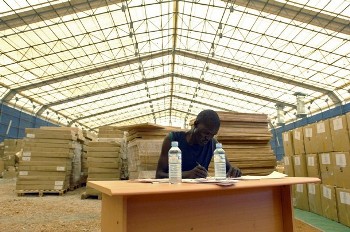South Sudan allocates 30m for 2015 elections as SPLM pushes for transformation
March 9, 2013 (JUBA) – As the new country gears up for its first elections after independence, South Sudan’s cabinet on Friday approved a sum of over 30million South Sudanese pounds for the exercise and directed the national elections commission to immediately begin establishing its organizational structures at the national level and across the ten states of the country.

The minister of information and official spokesperson of the government, Barnaba Marial Benjamin, told the press on Friday that the coming election was important for the democratic transformation in the new republic.
“The national elections commission is supposed to commence its work to become fully operational in order to organize itself… and to prepare for the elections of 2015…We need the elections for our democratic transformation and conducting ourselves in a democratic manner,” Marial told the press.
The preceding 2010 general elections were however marred with subsequent violence and rebellion which originated from within the ruling party (Sudan People’s Liberation Movement – SPLM) as members accused themselves of not following the right procedures for selection of candidates and later on rigging the elections as well.
As a result of discontent some SPLM party members opted out to contest as independent candidates where some won the elections such as the incumbent governor of Western Equatoria state, Joseph Baskasoro, and other independents who made it to the national and state parliamentary levels.
Others, such as late George Athor lost the election for Jonglei state’s governorship against the incumbent Kuol Manyang Juuk, and as a result launched a rebellion resulting to the loss of hundreds of lives on both sides.
The government is currently battling another rebellion in Jonglei’s Pibor county of Murle land, which was founded by another disgruntled loser of the 2010 elections, David Yauyau, who also accused the ruling party of doctoring the elections results.
Candidates from the opposition parties in the last elections also accused the ruling party of allegedly rigging the elections and violating the democratic principles it fought for as many party leaders complained of being denied freedom to rally for support among the grassroots in the states.
Officials in government are concerned that the next elections should be seen to be fair and transparent and strictly to the rules of the democratic principles as the country is reviewing the transitional constitution and drafting a permanent constitution under which the next elections shall be conducted.
The ruling party, which is the main driving force in the country, has begun reviewing its internal basic documents so that they comply with the reality of the situation as the country has become independent and to qualify for fresh registration.
The SPLM’s secretary general, Pagan Amum, on Thursday during the party’s political bureau meeting in Juba said the four documents that include the manifesto, constitution, code of conduct and rules and regulations will be passed by the highest executive organ of the party before presenting them to the national liberation council and finally to the party extra-ordinary convention.
Amum added that the SPLM was undergoing a transformational process that will result to fundamental internal changes in the party.
Reports collected by the party secretariats from the grassroots of all the ten states have collectively suggested that the ruling party has “lost direction and vision”.
Though Amum did not contemplate on what such internal changes will constitute, there are wide-spread speculations that the ruling party might have begun the process of introducing a change at the top leadership in order to effectively transform and be able to tackle important national programs that will move the government forward.
(ST)
